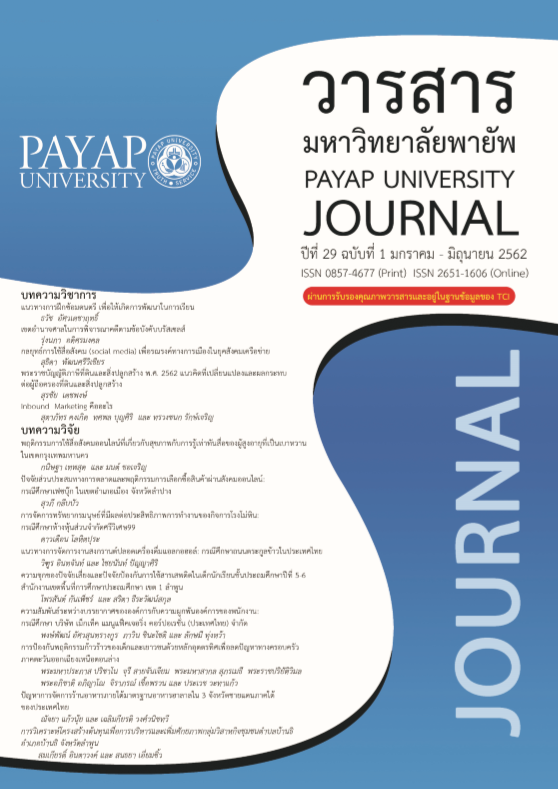ปัญหาการจัดการร้านอาหารภายใต้มาตรฐานอาหารฮาลาลใน 3 จังหวัดชายแดนภาคใต้ของประเทศไทย
Main Article Content
บทคัดย่อ
การวิจัยครั้งนี้มีวัตถุประสงค์ เพื่อศึกษาปัญหาการจัดการร้านอาหารภายใต้มาตรฐานอาหารฮาลาลใน 3 จังหวัดชายแดนภาคใต้ของประเทศไทย เป็นการวิจัยเชิงคุณภาพ โดยใช้การศึกษาทบทวนข้อมูลเอกสาร บทความ และการสัมภาษณ์เชิงลึกแบบกึ่งโครงสร้าง โดยเก็บข้อมูลจาก ผู้ประกอบการร้านอาหารที่ได้ขอรับรองมาตรฐานอาหารฮาลาลต่อเนื่อง 3 ปี จำนวน 15 ร้าน ร้านอาหารที่ไม่ได้ขอรับรอง จำนวน 15 ร้าน ผู้บริโภคจำนวน 45 ราย และเวทีแสดงความคิดเห็นนักวิชาการ ผู้เชี่ยวชาญ ผู้มีส่วนเกี่ยวข้องในพื้นที่จังหวัดปัตตานี ยะลา และนราธิวาส มีผลการวิจัยดังนี้ (1) สภาพแวดล้อมและสถานที่ไม่เอื้ออำนวยต่อการปฏิบัติตามข้อกำหนดมาตรฐานฮาลาล (2) วัตถุดิบบางชนิดที่มีเครื่องหมายฮาลาลมีราคาค่อนข้างสูง (3) เมนูอาหารไม่ตรงกับความต้องการและไม่สามารถควบคุมการรองรับงานที่เข้ามาเร่งด่วนของผู้บริโภคได้ (4) พนักงานบางรายไม่ใช่ชาวมุสลิมจึงไม่ปฏิบัติตามบทบัญญัติทางศาสนาอิสลาม (5) ความสามารถและคุณสมบัติเฉพาะด้านของพนักงานไม่เป็นไปตามเกณฑ์ที่ผู้ประกอบการกำหนด (6) มีผู้ประกอบการร้านอาหารบางรายเป็นบุคคลต่างศาสนามาร่วมหุ้น ยังขาดความรู้ ความเข้าใจในกฎระเบียบ ข้อบังคับ และมาตรฐานการขอรับรองมาตรฐานอาหารฮาลาล (7) ผู้ประกอบการ ร้านอาหารเป็นชาวมุสลิม มักคิดว่าไม่จำเป็นต้องขอรับรองตราฮาลาล (8) ผู้ประกอบการได้รับผลกระทบจากปัญหาเศรษฐกิจตกต่ำอันเนื่องมาจากสาเหตุความไม่สงบใน 3 จังหวัดภาคใต้ และ (9) การขอใบรับรองเครื่องหมายฮาลาลมีขั้นตอนการขอรับรองยุ่งยาก ใช้ระยะเวลานาน อัตราค่าธรรมเนียมและค่าใช้จ่ายในการดำเนินการสูง จากปัญหาทั้งหลายที่พบจากการศึกษาได้นำไปสู่ข้อเสนอแนะเพื่อเป็นแนวทางการปรับปรุงมาตรฐานอาหารฮาลาลใน 3 จังหวัดชายแดนใต้ของประเทศไทยต่อไป
Article Details
เอกสารอ้างอิง
ผู้ประกอบการที่ขอรับรองมาตรฐานอาหารฮาลาลร้านที่ 2. ( 2561) สัมภาษณ์, มีนาคม.
ผู้ประกอบการที่ขอรับรองมาตรฐานอาหารฮาลาลร้านที่ 7. (2561) สัมภาษณ์, มีนาคม.
ผู้ประกอบการที่ขอรับรองมาตรฐานอาหารฮาลาลร้านที่ 9. (2561) สัมภาษณ์, มีนาคม.
ผู้ประกอบการร้านอาหารฮาลาลที่ไม่ขอรับรองมาตรฐานอาหารฮาลาลร้านที่ 5. (2561) สัมภาษณ์, มีนาคม.
ผู้ประกอบการร้านอาหารฮาลาลที่ไม่ขอรับรองมาตรฐานอาหารฮาลาลร้านที่ 6. (2561) สัมภาษณ์, มีนาคม.
ผู้ประกอบการร้านอาหารฮาลาลที่ไม่ขอรับรองมาตรฐานอาหารฮาลาลร้านที่ 10. (2561). สัมภาษณ์, มีนาคม.
ผู้ประกอบการร้านอาหารฮาลาลที่ไม่ขอรับรองมาตรฐานอาหารฮาลาลร้านที่ 13. (2561) สัมภาษณ์, มีนาคม.
โรงเรียนนักข่าวชายแดนใต้. (2558). ผอ.ศูนย์ฮาลาลเหนื่อยใจ ร้านมุสลิมไม่สนใจรับรองฮาลาล ทั้งที่ทุกแห่งตรวจเจอปนเปื้อนสิ่งผิด, สืบค้นเมื่อ 15 กันยายน 2560. https://deepsouthwatch.org/dsj/th/7763.
วิวัฒน์ หวังเจริญ. (2559). มาตรฐานฮาลาล ออนไลน์, สืบค้นเมื่อ 20 กันยายน 2560. http://coursewares.mju.ac.th: 81/e-learning2551/FT491/len.htm.
ศูนย์วิทยาศาสตร์ฮาลาล จุฬาลงกรณ์มหาวิทยาลัย. (2554). เครื่องหมายฮาลาลที่ถูกต้องตามระบบการรับรอง, สืบค้นเมื่อ 21 กันยายน 2560. http://www.halalscience.org/archives/36966.
สำนักงานสถิติแห่งชาติ. (2560). รายงานสถิติรายปีประเทศไทย พ.ศ.2560 (Statistical Yearbook Thailand), สำนักงานสถิติแห่งชาติ กระทรวงเทคโนโลยีสารสนเทศและการสื่อสาร, สืบค้นเมื่อ 15 กันยายน 2560. www.nso.go.th/sites/2014/Pages/e-Book/รายงานสถิติรายปี.aspx.


